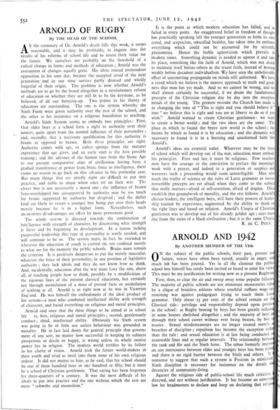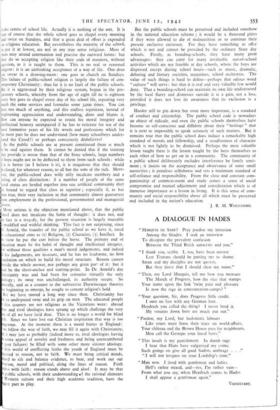ARNOLD AND 1942
By ANOTHER MEMBER OF THE VIth
ON the subject of the public schools, their past, present an future, voices have often been raised, usually in anger, an much ink has been poured. Yet in all the clamour the public school boy himself has rarely been invited or heard to utter his view This must be my justification for writing now as a present Rugbeia First, then, to clear the air and sweep away some popular fallacie The majority of public schools are not miniature monasteries rule by a clique of brainless athletes where youthful ruffians wage un remitting war against pedagogues trying to teach them Lai grammar. Only about is per cent. of the school remain on th Classical side: privilege and responsibility depend upon positio in the school: at Rugby beating by boys has been greatly reduc in some houses abolished altogether ; and the majority of boys g through their school career without ever being beaten, by boy master. Sexual misdemeanours are no longer treated merely breaches of discipline ; expulsion has become the exception rath than the rule: and sexual education is at last being conducted 0 reasonable lines and at regular intervals. The relationship betwe the rank and file and the Sixth form. The taboo formerly irnPos on any intercourse between older and younger boys has been rais and there is no rigid barrier between the Sixth and others. It nonsense to suggest that such a system is Fascism in miniature Sixth discipline is necessary for insistence on the details decencies of community-living.
Against the religious side of public-school life much criticism directed, and not without justification. It has become an unwritt law for headmasters to declare and keep on declaring that reli
is the centre of school life. Actually it is nothing of the sort. It is true of course that the whole school goes to chapel every morning and twice on Sundays, and that a great deal of effort is expended on religious education. But nevertheless the majority of the school, to put it at lowest, are not in any true sense religious. Most of them may attend communion and practise the outward forms: but they do so accepting religion like their code of manners, without question, as it is taught to them. This is no real or reasoned religion : it is an unthinking acceptance of a way of life. One does not swear in a drawing-room: one goes to church on Sundays. This failure of public-school religion is largely the failure of con- temporary Christianity: thus far it is no fault of the public schools.
But it is aggravated by their religious system, begun in the pre- paratory schools, whereby from the age of eight till he is eighteen every boy goes to chapel every day of his school life, repeating very much the same services and formulas some 3,000 times. You can have too much of anything, and this endless repetition, instead of heightening appreciation and understanding, dims and blunts it. How can anyone be expected to retain his moral integrity and Intellectual honesty unimpaired if he has to reiterate for ten of the most formative years of his life words and professions which for the most part he does not understand (how many schoolboys under- stand the Creed?) or perhaps consciously disbelieves?
As the public schools are at present constituted there is much to be said against them. It cannot be denied that if the training they provide is worse than that of the State schools, large numbers of boys ought not to be deflected to them from such schools : while i it is better (as I believe it is), it is iniquitous that they should he closed, for whatever reason, to all but the sons of the rich. More- er, the public-school does willy nilly inculcate snobbery and a .celing of class distinction : if a number of people of the same ucial status are herded together into one artificial community they ire bound to regard that class as superior ; especially if, as has xen true, their very inclusion in that community almost guarantees em employment in the professional, governmental and managerial ses.
More serious is the objection mentioned above, that the public hoot does not inculcate the habit of thought : it does not, and fact is a tragedy, for the present situation is largely traceable muddled and wishful thinking. This fact is not surprising, since Arnold, the founder of the public school as we have it, rated educational aims as (t) Religion, (2) Character, (3) Intellect. In view he put the cart before the horse. The primary end of ucation must be the habit of thought and intellectual integrity. or without these qualities a man's moral judgements, and indeed I his judgements, are insecure, and he has no loadstone, no firm undation on which to build his moral structure. Reason cannot ovide the whole answer, nor perhaps any great part of it: but it ust be the sheet-anchor and starting-point. In Dr. Arnold's day ristianity was and had been for centuries virtually the only ology ; its sway was unchallenged, its authority secure. So rurally, and as a counter to the subversive Darwinesque theories t beginning to emerge, he sought to cement religion's hold But we have moved a long way since then. Christianity has t its undisputed sway and its grip on men. The educated people this country are not religious as the Victorians were : abroad er and rival ideologies have sprung up which challenge the very t of all we have held dear. This is no longer a world for blind th. Since we have lost our Christian inspiration that way is too gerous. At the moment there is a moral hiatus in England : we follow the way of faith, we-may fill it again with Christianity, t it may just as probably (indeed more so, rival ideologies having extra appeal of novelty and freshness and being unencumbered past failures) be filled with some other more sinister ideology.
this world of conflicting faiths the youth of England must be ucated to reason, not to faith. We must bring critical minds, ned to sift and balance evidence, to bear, and work out our 'ation, moral and political, al6ng the lines of reason. Faith hes with faith : reason stands above and aloof. It may be that
public schools, with their understanding stf the rational elements Western culture and their high academic tradition, have the gest part to play. But the public schools must be preserved and included somehow in the national education scheme ; it would be a thousand pities if they were allowed to die of malnutrition or to continue their present exclusive existence. For they have something to offer which is not and cannot be provided by the ordinary State day schools. Firstly, as boarding-schools, they have many great advantages: they can cater for many invaluable out-of-school activities which are not feasible at day schools, where the boys are dispersed except during school hours—such as music, dramatic, debating and literary societies, magazines, school orchestras. The value of such things is hard to define—perhaps that odious word " culture" will serve: but that it is real and very valuable few would deny. That a boarding-school can maintain its own life undistracted by the local flurry and distresses outside it is a gain, not a loss, provided it does not lose its awareness that its exclusion is a privilege.
Harder still to pin down but even more important, is a standard of conduct and citizenship. The public school code is nowadays an object of ridicule, and even the public schools themselves have become so self-conscious and diffident about their " heritage " that it is next to impossible to speak seriously of such matters. But it remains true that the public school does induce a remarkably high standard of morals and fellowship, and a steadfastness of character which is not lightly to be dismissed. Perhaps the most valuable lesson taught there is the lesson taught by the boys themselves to each other of how to get on in a community. The community of a public school deliberately excludes interference by family senti- ment ; it insists on the acceptance and observance of some small austerities ; it penalises selfishness and sets a minimum standard of self-reliance and responsibility. From the close and constant com- panionship of common-room and study comes a sense of social compromise and mutual adjustment and consideration which is of immense importance as a lesson in living. It is this sense of com- munity and social responsibility above all which must be preserved and included in the nation's education.
J. R. M. WHITEHORN.



























 Previous page
Previous page